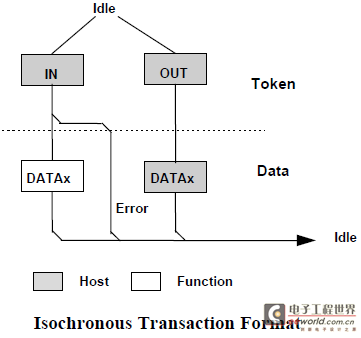USB协通讯议--深入理解
步传输是不可靠的传输,所以它没有握手包,也不支持PID翻转。主机在排定事务传输时,同步传输有最高的优先级。
同步传输适用于必须以固定速率抵达或在指定时刻抵达,可以容忍偶尔错误的数据上。实时传输一般用于麦
克风、喇叭、UVC Camera等设备。实时传输只需令牌与数据两个信息包阶段,没有握手包,故数据传错时不会重传。

Isochronous data is continuous and real-time in creation, delivery, and consumption. Timing-relatedinformation is implied by the steady rate at which isochronous data is received and transferred. Isochronousdata must be delivered at the rate received to maintain its timing. In addition to delivery rate, isochronousdata may also be sensitive to delivery delays. For isochronous pipes, the bandwidth required is typicallybased upon the sampling characteristics of the associated function. The latency required is related to thebuffering available at each endpoint.
A typical example of isochronous data is voice. If the delivery rate of these data streams is not maintained,drop-outs in the data stream will occur due to buffer or frame underruns or overruns. Even if data isdelivered at the appropriate rate by USB hardware, delivery delays introduced by software may degrade applications requiring real-time turn-around, such as telephony-based audio conferencing.
The timely delivery of isochronous data is ensured at the expense of potential transient losses in the data stream. In other words, any error in electrical transmission is not corrected by hardware mechanisms such as retries. In practice, the core bit error rate of the USB is expected to be small enough not to be an issue. USB isochronous data streams are allocated a dedicated portion of USB bandwidth to ensure that data can be delivered at the desired rate. The USB is also designed for minimal delay of isochronous data transfers.
USB协通讯 相关文章:
- Windows CE 进程、线程和内存管理(11-09)
- RedHatLinux新手入门教程(5)(11-12)
- uClinux介绍(11-09)
- openwebmailV1.60安装教学(11-12)
- Linux嵌入式系统开发平台选型探讨(11-09)
- Windows CE 进程、线程和内存管理(二)(11-09)
